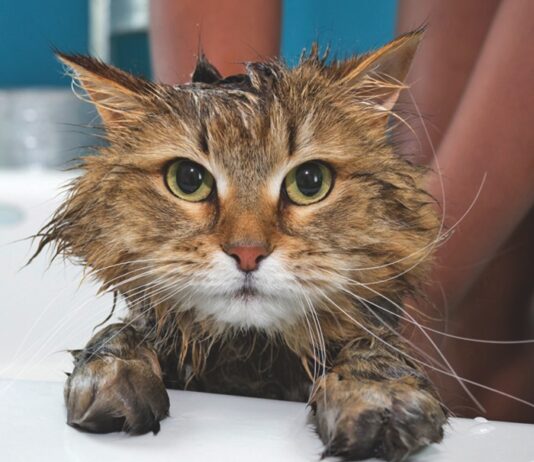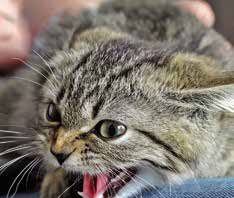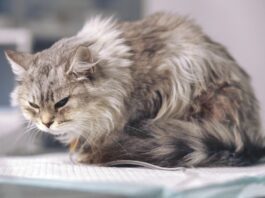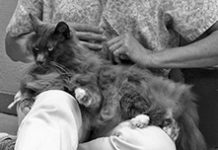When You Want to Adopt a Stray
Your next cat may show up when you least expect it. You glance out the window and see a skinny cat with a dirt-smudged coat looking back at you. He doesn’t rush to greet you like a lovable, lost Labrador Retriever. He sizes you up, determining if you’re friend or foe. You place bowls of food and water on the back porch to prevent him from starving or becoming dehydrated, but as the days pass and the cat moves closer to you and lets you pet him, you’re smitten. You’ve made the transition from performing an act of kindness to wanting to provide a safe, loving home.
Ask Elizabeth: February 2013
As you know, we cats are very sensitive creatures, but in your case, as with other cats with feline hypersensitivity syndrome (FHS), this sensitivity seems to be ratcheted up to varying degrees. FHS is a recognized syndrome in the feline world, although the definitive cause is not clear at this time. While it is not, in and of itself, believed to be serious with respect to its effect on overall health or longevity, a few important points regarding this unusual behavioral syndrome are worth making, especially for our human friends who are commonly puzzled by its manifestations. FHS, also variably referred to as rolling skin syndrome and atypical neurodermatitis, is characterized by dramatic twitching or rippling of the skin, most commonly on the back between the middle of the spine and the base of the tail or in the flank region, with intermittent jerking of the body and exaggerated tail movements.
They Jump, Paw, Cry, Stare and Meow
Considering that kittens vocalize to their mothers for everything they want, it’s not unusual for cats to meow or beg for food and attention from their owners. In cat-owning households, humans are the mother cats.
Kittens and the Aging Are Vulnerable
When a kitten or elderly cat shows little interest in food, loses weight, develops a persistent fever and succumbs to an untimely death, too many heartbroken owners are left to wonder: What was the cause of death?
Why Do They… knead with their paws?
Theories on cats’ kneading or treading — rhythmically moving their front paws up and down while flexing and extending their toes — run the gamut from scent marking to mimicking their ancestors in the wild who tamped down grass to create a nest. Kneading, also known as making biscuits, is certainly one of cats’ most beguiling behaviors.
In The News: The mysterious purr eludes translation
Conventional wisdom has long held that purring is a sign of contentment, a cat purring on a sunny windowsill by the owner’s side being a perfect example. However, researchers have found that cats also purr in other, often surprising situations — when giving birth and nursing, when under duress and even when dying.
Ask Elizabeth: November 2012
Q: My wonderful rescued cat scratches hot spots occasionally. They look just awful but heal nicely and the hair comes back and fills the spot in. I keep an eye on them for infections, but none has ever become infected. What on earth causes my cat to do this to herself? She’s an only cat and there has not been any change in the food I feed her. Sincerely,Hot Under the Fur …
Ask Elizabeth: August 2012
I have been purring nearly my whole life so I should be an expert! However, like many feline characteristics, purring is mysterious — even to me! Let me share what my friends at the Cornell Feline Health Center have to say about purring. At its core, purring is a means of communication — but cats purr in a variety of situations: when they are comfortable and content, of course, but also when they are anxious, injured or ill. What, exactly, a cat is communicating in these various situations is open to interpretation. The most straightforward purring is done by baby kittens. Starting at about two days of age, kittens purr in the presence of their mother, and in response to nursing. This early purring is likely to be an ‘I’m OK’ signal to the queen, and along with kneading movement of the front paws on the mammary gland area, may serve as a stimulus for milk letdown.
A Commitment to Improving Well-being
Imagine veterinarians being able to sterilize feral cats by vaccination instead of surgery. Or to identify the connection between a relatively benign form of feline coronavirus and feline infectious peritonitis, which is nearly always fatal, with the hope of finding ways to diagnose and combat it. Or discover how and why vaccine-associated sarcomas may trigger DNA damage in some cats and how this damage may be used to predict which cases of the sarcomas are amenable to chemotherapy. These are just three of the many scientific studies funded by the Cornell Feline Health Center where, under the guidance of Director Colin Parrish, Ph.D., Professor of Virology, the goal of bettering the health of cats continues to be the focus and commitment, as it has been since the center opened its doors in 1974.
When Aggression Has a Physical Basis
Your cat is shy but generally sweet natured and affectionate. Imagine your shock, then, when you reach to pick him up and he tries to bite you — for no apparent reason. Did your cat’s inner tiger emerge? When the onset of feline aggression is sudden, there’s a good chance that the source could be a health problem, and you need to make an appointment with your veterinarian. “A medical cause for aggression in cats is relatively rare, but it must always be ruled out,” says Katherine A. Houpt, VMD, Ph.D., diplomate of the American College of Veterinary Behaviorists and emeritus James Law Professor of Animal Behavior at Cornell University’s College of Veterinary Medicine. “The primary cause of medically based aggression is pain, no matter what the source of that pain.”
Is it Normal Shedding or Hair Loss?
With the exception of hairless breeds such as the Sphynx, cats are known for their furry pelts, so if a cat starts to lose his coat, it’s justifiably cause for concern. How can you distinguish between normal shedding and abnormal hair loss? It’s easy: Shedding doesn’t cause bald spots. If the skin is visible, best to schedule a veterinarian exam or ask for a referral to a dermatologist. Hair loss, or alopecia, takes two main forms, says dermatologist William H. Miller, VMD, Medical Director of the Companion Animal Hospital at Cornell University College of Veterinary Medicine: “The hairs fall out spontaneously.” Though it’s a rare occurrence, spontaneous hair loss can be related to stress, endocrine diseases such as Cushing’s disease (an overproduction of cortisol by the adrenal glands), hyperthyroidism (excess production of the thyroid hormones), and some forms of cancer, including lymphoma, liver or pancreatic cancer.
Is Your Cat Afraid of Strange Noises?
Whenever cat owner Susan Lomond turns on her printer, her cat Sylvester dashes over to sit on it, lie on it and watch in fascination as the paper comes out. But when Susan’s friend Diana turns on her printer, her cat, Petra, flees in terror. Cats respond differently to noise depending on their personalities and experiences — and even their genetics. When cats get scared of noise, we often feel the need to soothe them. Actually, that may not be helpful. How to Help Your Cat. Cats differ from dogs when it comes to being frightened by noise. Dogs are notoriously afraid of thunder and fireworks, and will often try to escape from the house in a panic. Cats are more likely to be scared of unexpected noises around the house, such as the vacuum cleaner, construction work or a hair dryer. “But thunder and fireworks don’t seem to bother cats,” says Katherine A. Houpt, VMD, PhD, the emeritus James Law Professor of Animal Behavior at Cornell University’s College of Veterinary Medicine. “I have never seen fireworks or thunder phobia in cats,” she says.














